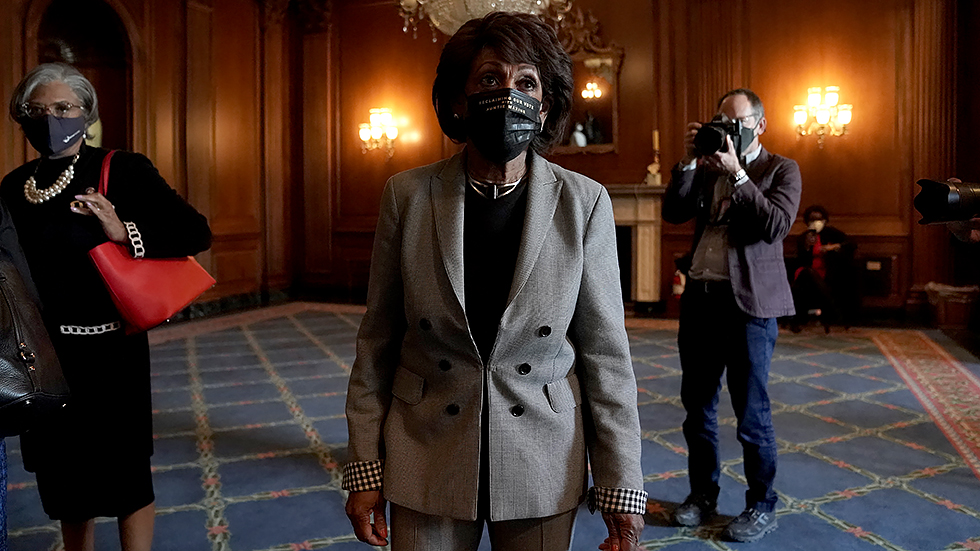Hillicon Valley — Presented by LookingGlass — Congress looks to strengthen government’s aging cyber infrastructure

Today is Tuesday. Welcome to Hillicon Valley, detailing all you need to know about tech and cyber news from Capitol Hill to Silicon Valley. Subscribe here: digital-release.thehill.com/newsletter-signup.
Congress is eying sending cybersecurity funds to state and local governments, which have been battered by numerous cyber threats during the COVID-19 pandemic as more services moved online to more vulnerable systems.
Meanwhile, the Twitter account of one House Democrat appeared to have been hacked, and Cybersecurity Awareness Month continued with Google announcing new security steps, and The Hill hosting a Cybersecurity Summit.
Follow The Hill’s cyber reporter, Maggie Miller (@magmill95), and tech team, Chris Mills Rodrigo (@millsrodrigo) and Rebecca Klar (@rebeccaklar_), for more coverage.
Let’s jump in.
Congress eyes lending state and local governments a hand

Congress is working to funnel resources to beef up state and local government cybersecurity infrastructure after the COVID-19 pandemic forced municipalities to move many essential operations to aging and vulnerable online sources.
Big money: Included in the bipartisan infrastructure bill passed by the Senate in August is $1 billion to shore up government cybersecurity after a year in which hackers took full advantage of targeting systems. Officials say lessons have been learned.
“Cybersecurity has been the No. 1 issue and priority for state chief information officers. That hasn’t changed, but certainly the pandemic has exacerbated a lot of things in terms of funding, in terms of resources, and how to ensure that you are maintaining enterprise levels of cybersecurity while doing it virtually,” Matt Pincus, the director of government affairs at the National Association of State Chief Information Officers, told The Hill.
History of attacks: States and local governments were already facing cyber threats before the pandemic hit, particularly when it came to ransomware attacks. A spree of coordinated attacks hit almost two dozen Texas city governments in 2019, and attacks on major cities that same year, including Baltimore, Atlanta and New Orleans, caused millions of dollars in damages and debilitated city services.
States and localities already prone to such attacks were forced to move their services online with just a few days notice in early 2020 when the pandemic struck, forcing many to initially prioritize resident services over cybersecurity, which left systems open to vulnerabilities.
These have included an increase in fraud cases around unemployment and other pandemic benefits, along with an explosion in ransomware attacks. Pincus told The Hill that 60 percent of state chief information officers said ransomware was their “No. 1 cybersecurity concern.”
A MESSAGE FROM LOOKINGGLASS
In 2021, LookingGlass observed 170,000 instances of DIB assets acting as C2s for malware. Learn how LookingGlass can provide a global attack surface view to better protect critical infrastructure.
Bad day for one congresswoman

Rep. Maxine Waters (D-Calif.) tweeted Tuesday that her Twitter account had been hacked and erased despite her profile appearing unchanged.
“I have been hacked and my Twitter account has been erased,” the House Financial Services Committee chairwoman tweeted late Tuesday morning, seemingly in control of her account. “I know who has done this. I will take care of this. M Waters.”
The California lawmaker’s account did not appear to have any posts deleted as of Tuesday afternoon.
The Hill has reached out to Waters’s office for further details.
GOOGLE STEPS UP TO THE CYBER PLATE
Google on Tuesday announced the creation of a new cybersecurity team to help respond to attacks against governments and other critical groups, along with a new program to help strengthen the cybersecurity of businesses.
The Google Cybersecurity Action Team will be made up of company cybersecurity experts, and will provide customers with incident response services, advisory services for security plans, and ways to deploy Google Cloud in a secure way that will make it more difficult for these customers to be successfully targeted by hackers.
“Cybersecurity is at the top of every C-level and board agenda, given the increasing prominence of software supply chain exploits, ransomware, and other attacks,” Google Cloud CEO Thomas Kurian said in a statement Tuesday. “The Google Cybersecurity Action Team is part of our ongoing commitment to be the best partner for our enterprise and government customers along their security transformation journey.”
Phil Venables, the CISO and vice president of Google Cloud, told reporters ahead of the announcement of the new team that they hoped it would be the “world’s premier cybersecurity advisory team.”
BIG TECH WORKERS TAKE A STAND
A coalition of Amazon and Google workers released an open letter Tuesday calling on their respective employers to pull out of a contract with the Israeli government.
More than 300 Amazon and nearly 100 Google employees have anonymously signed the letter published in The Guardian demanding the termination of Project Nimbus.
Both companies are providing cloud services to the Israeli military and government under the $1.2 billion contract signed earlier this year.
“This contract was signed the same week that the Israeli military attacked Palestinians in the Gaza Strip – killing nearly 250 people, including more than 60 children,” the workers wrote.
A MESSAGE FROM LOOKINGGLASS
Protect critical infrastructure with an outside-in approach and actionable threat intelligence. Learn how LookingGlass can help mitigate vulnerabilities, exposures, and threats before an attack occurs.
TIKTOK IN THE HOT SEAT
Senate Homeland Committee Chair Gary Peters (D-Mich.) sent a letter to social media app TikTok on Tuesday, pressing the company on the steps that its taking to remove extremist content from its platform in the wake of the Jan. 6 Capitol attack.
In the letter to Tik Tok CEO Shou Zi Chew, Peters asked for information on how the company monitors conspiracy content in addition to how it addresses increases in content that promotes domestic terrorism and extremism.
“In the lead up to the January 6th attack on the U.S. Capitol, domestic extremists reportedly used TikTok to recruit, organize, and communicate,” Peters wrote, citing a Jan. 12 report from left-leaning Media Matters for America.
FACEBOOK ALSO IN THE HOT SEAT
The family of a slain journalist is asking the Federal Trade Commission (FTC) to take action against Facebook for not removing online footage of the reporter’s death.
Andy Parker, whose daughter Alison Parker was shot and killed while reporting in 2015, is alleging in a complaint to be filed Tuesday that Facebook is violating its own terms of service by hosting videos on its platform and on Instagram that promote violence, The Associated Press reported.
Parker, a TV news reporter, was killed alongside cameraman Adam Ward by a former co-worker while reporting for WDBJ in Roanoke, Va. Footage of the shooting still resurfaces on Facebook and Instagram despite assurances from top Facebook executives that it will be removed, according to the complaint.
SHOTSPOTTER VS. VICE
The gunshot detection company ShotSpotter on Monday filed a $300 million defamation lawsuit against Vice Media, alleging it made a series of false statements in a series of stories on the company’s practices and the effectiveness of its acoustic technology.
ShotSpotter argues in the case that reporting by Vice’s tech vertical Motherboard has cost it trust and contracts with police departments. It filed the complaint in Delaware Superior Court.
“Vice crossed a serious line, we couldn’t let this pass,” ShotSpotter CEO Ralph Clark told reporters Tuesday. “We’re forced to set the record straight and recover our damages through this lawsuit.”
A spokesperson for Vice declined to comment on the lawsuit given the ongoing case.
BITS AND PIECES
An op-ed to chew on: Local communities are a key piece in the broadband puzzle
Lighter click: Bat dog
Notable links from around the web:
Big tech sweeps up Hill staffers — just when Congress needs them the most (Politico / Emily Birnbaum and John Hendel)
A Harvard Study Is Going Viral Among Anti-Vaxxers. The Author Says They Are All Wrong. (Mother Jones / Ali Breland)
Revealed: Facebook’s Secret Blacklist Of “Dangerous Individuals And Organizations” (The Intercept / Sam Biddle)
One last thing: The Hill’s Cybersecurity Summit

The Hill on Tuesday hosted a Cybersecurity Summit featuring as part of honoring Cybersecurity Awareness Month.
The event featured interviews with former Homeland Security Secretary Janet Napolitano, Rep. Yvette Clarke (D-N.Y.), former Rep. Mike Rogers (R-Mich.) and cybersecurity experts from the private sector.
That’s it for today, thanks for reading. Check out The Hill’s technology and cybersecurity pages for the latest news and coverage. We’ll see you Wednesday.
{mosads}
Copyright 2023 Nexstar Media Inc. All rights reserved. This material may not be published, broadcast, rewritten, or redistributed.



